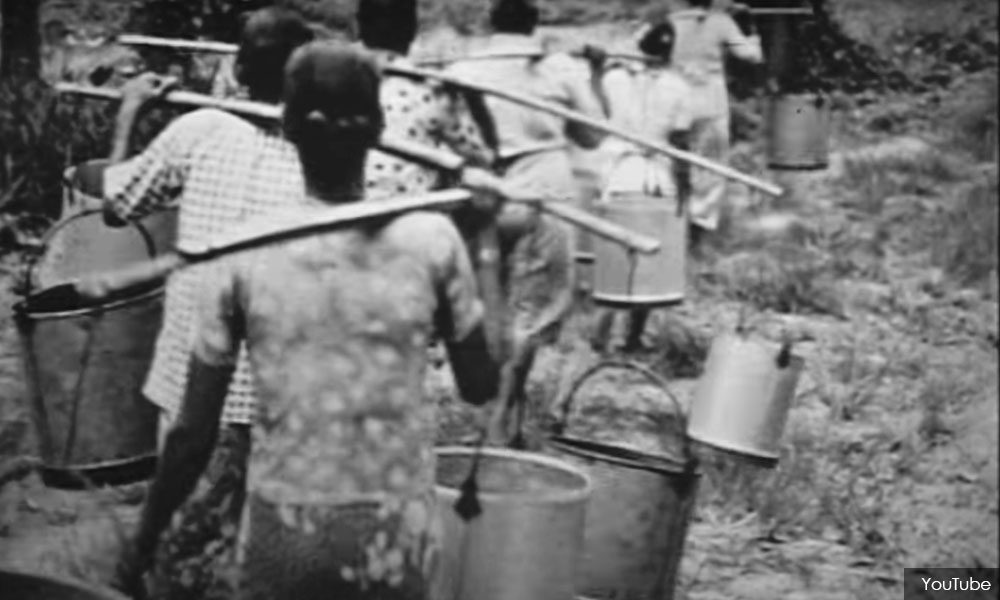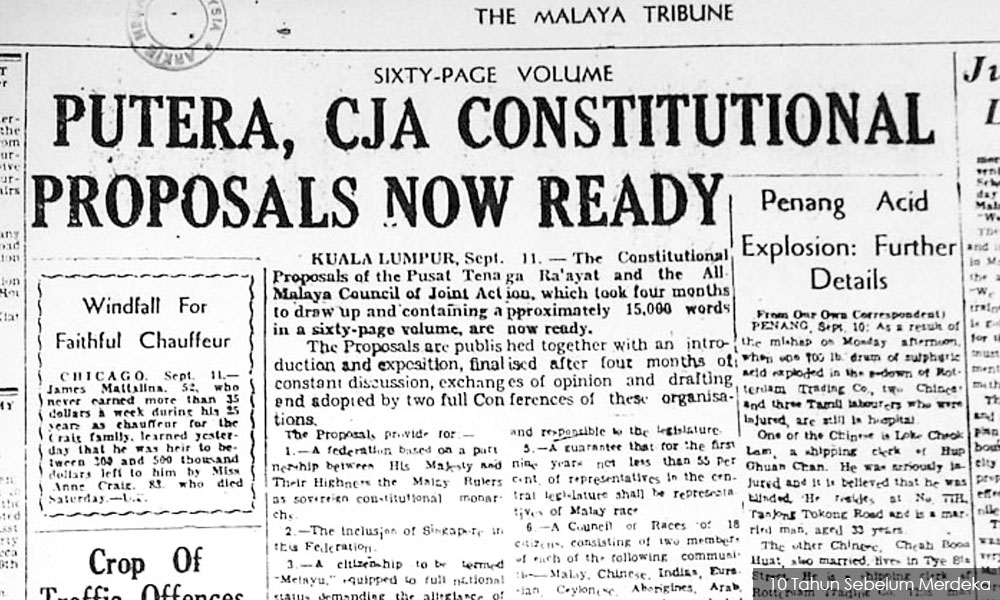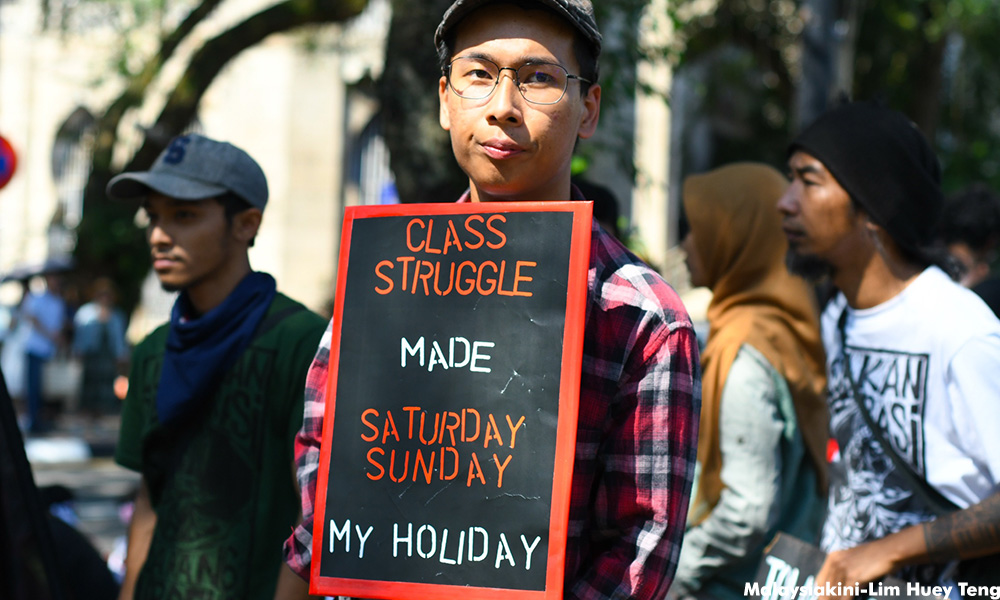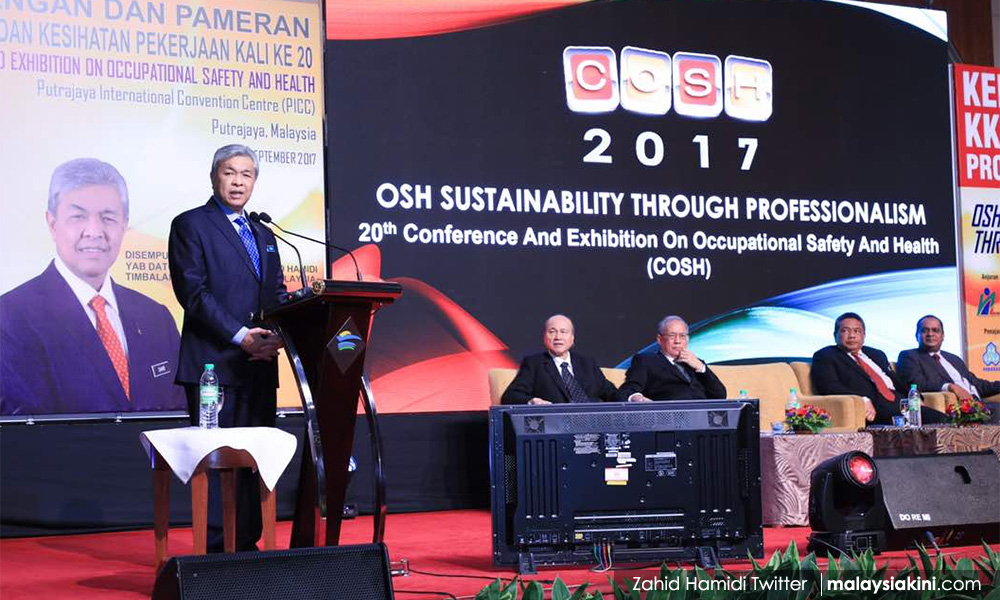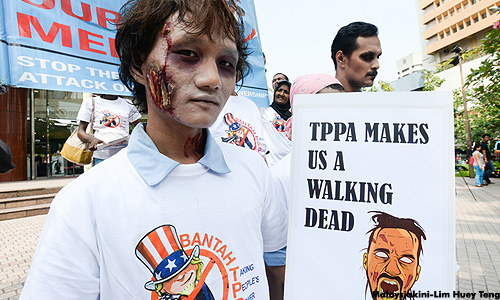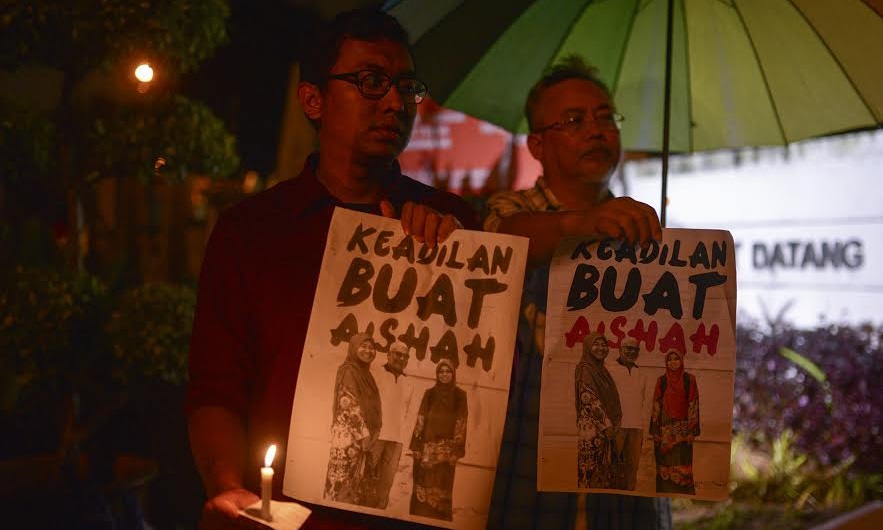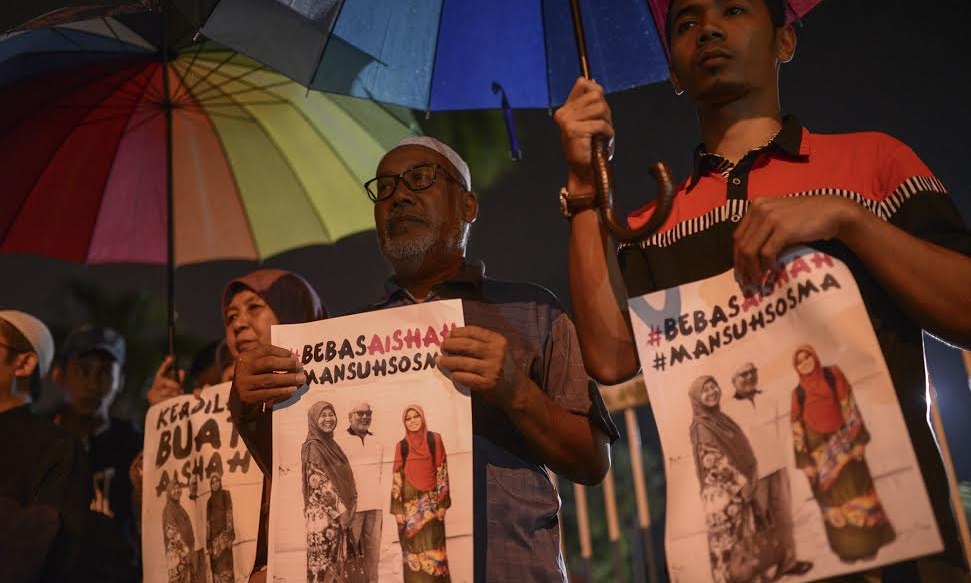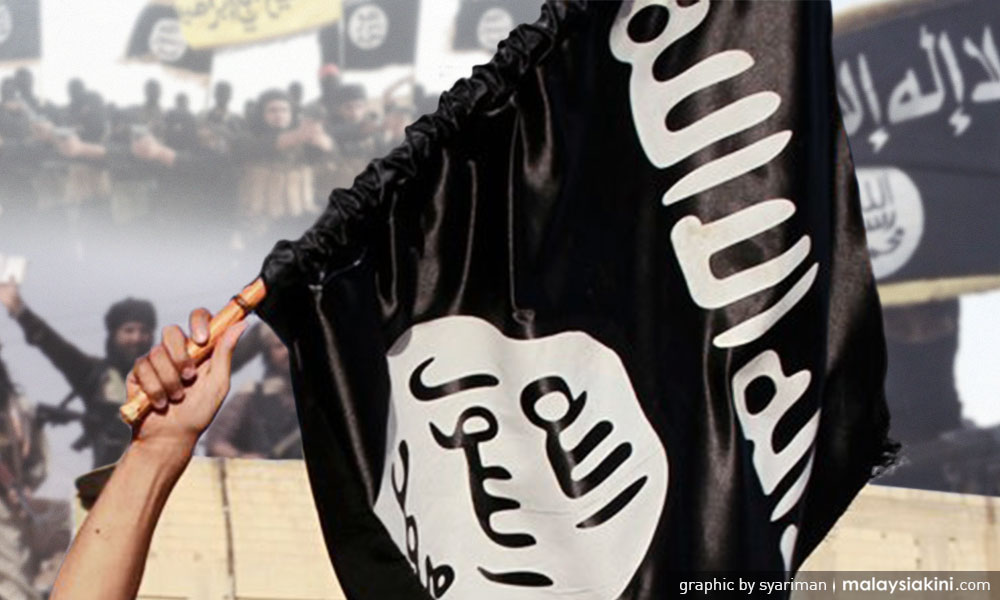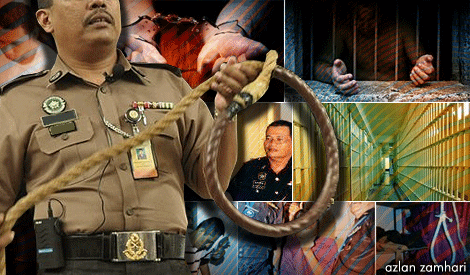Human Rights and the Student Movement? The students and the youths generally have been in the forefront of the struggle for human rights especially for the poor and marginalized...the landless poor, poor farmers, urban settlers...
The Teluk Gong struggle began as a struggle by poor landless peasants to obtain land. In 1967, the peasants, led by Hamid Tuah, cleared some forest land in the Teluk Gong region of Selangor where they tilled the land and built houses.Not long afterwards, the government destroyed the crops and demolished the houses of the peasants. Hamid Tuah and his followers were arrested.The cruelty inflicted by the government upon the poor peasants of Teluk Gong was angrily denounced by the students of the University of Malaya.
Fighting four your own rights when you are affected is good - but Human Rights Defenders who struggle for rights and justice of others, where victory will really not bring them any benefit safe the satisfaction of upholding the cause of justice and human rights is better.
The Tasik Utara incident occured in September 1974. It involved poor, predominantly Malay squatters who openly opposed the government. in the case of Teluk Gong, the Tasik Utara incident virtually invited student involvement. Tasik Utara is situated about three miles from the centre of Johor Baru where housing is a serious problem.The houses in the town are expensive to rent, which workers cannot afford...However after the Barisan Nasional emerged victorious in the General Elections, the leaders appeared to forget the promises they had made to the squatters.The residents of Kampung Barisan Nasional got a rude shock when they received eviction notices from the land office warning them that their homes were to be demolished.
In Malaysia, being a HR Defender is tough - you may end up arrested, imprisoned, expelled or suspended from university, terminated from your employment, ridiculed.....yes, a lot of RISKS but still many are willing to take the risk for a better world...a better Malaysia. The risks will always be there ...and one can choose indifference or self interests, or we can be Human Rights Defenders...for the greater good of the human community...
The Baling events began on l9th November 1974, when more than 1,000 peasants demonstrated.Their demonstrations continued on the 20th and 21 st November. On the 21 st, more than 13,000 people from Baling and the surrounding areas....Why did the farmers in Baling demonstrate? the answer lies in the misery and suffering they were facing. Inflation from 1973 had caused the prices of food and other basic necessities to soar....They bravely took to the streets to protest and urge the government to raise the price of rubber and lower the price of food and other necessities within 10 days...The struggle of the peasants was supported by students from the universities and other institutions of higher learning throughout the country.A big demonstration by 5,000 students was held on 3rd Decernber 1974...
In any struggle for justice or rights - it is always best to struggle with others (in solidarity) - though at times, it still may boil down to acting alone if others are simply too fearful or disinterested in struggling for justice and human rights/. Of late, students in large numbers seem to missing in the struggle for human rights ...Now, even the issues that they seem to be taking up are issues of personal concerns as students - 'academic freedom', scholarship/student loans ... What happened? Are they no longer going to champion causes of the poor and marginalized?
The Student Movement In Malaysia, 1967 - 74
From: Hassan KarimThe student movement in Malaysia has its origins before the second World War. In the early 1930s, teacher trainees from the Sultan Idris Training College established the KMM or Kesatuan Melayu Muda (Young Malay Union), which opposed British colonialism and desired independence.
In the fifties, students at the University of Malaya (established in 1949), then located in Singapore, enjoyed close relations with the anti-colonial movement, including nationalist journalists and unionists.
Thus, university students were actively involved in the struggle for independence. The development of the student movement at the University of Malaya in Singapore continued until the university moved to its Kuala Lumpur (K.L.) campus from 1959. In the early K.L. years, the character of student activities was different.
Students focussed instead on campus issues, especially in connection with student welfare matters. The emergence of the social and political dimensions of the student movement began around 1967.
Various events during that year distinguish it as a year of transition in the history of the student movement. From 1967, the student movement gradually advanced once again. In the following years, as it became more vocal, it became a force to be reckened with in the political upheavals of the country.
Several more universities were set up from 1969, a development which helped to strengthen and increase the influence of the student movement, The universities formed were Universiti Kebangsaan Malaysia (UKM), Universiti Sains Malaysia (USM), Universiti Teknologi Malaysia (UTM) and Universiti Pertanian Malaysia (UPM).
The increase in the number of universities meant an increase in the nurnber of university students. At the same time, more and more students from poor and rural backgrounds obtained places in universities.
These students were to play an important role in the student struggles in the years to come.
1967: The Year of Transition
1967 is regarded as the transition year for the student movement as students began to raise vital issues relating to the lives of the people.
In the historic Teluk Gong landless squatter struggle, both the University of Malaya Students Union (UMSU) and the University of Malaya Malay Language Society (PBMUM) were directly involved.
In 1967 also, a symposium on problems faced by rural communities was held at the University of Malaya.
The fact that this symposium was sponsored by the PBMUM is significant, as prior to this, the PBMUM had mainly confined itself to issues of Malay culture and language.
In addition to this, 1967 saw the founding of the Socialist Club of the University of Malaya, the only political club in the University.
Its founding represented a new era for the student movement, and its influence on the Ma.laysian student movement was not insignificant.
In 1967, the student movement was still concentrated in the University of Malaya, though teacher-training colleges had their own student organizations.
This can be explained by the fact that conditions in the University of Malaya differed from the conditions in these colleges.
Various student bodies were to be found in the University of Malaya. The largest of these was UMSU, which represented all students of the University of Malaya.
By virtue of this, it had members from all racial groups. Other important student bodies included the PBMUM, th.e Chinese Language Society (CLS), The Tamil Language Society (TLS) and the University of Malaya Islamic Students Society (PMIUM) all of which were affiliated to UMSU.
Only the Socialist Club maintained autonomy. In 1967 too, several student bodies were led by progressive individuals like Syed Hamid Ali, who became the Secretary General of UMSU, and Sanusi Osman, who became President of the PBMUM. Both were also members of the Socialist Club.
The Teluk Gong Struggle
UM students listening to Sharifah Mahani Syed Hamzah talking about the oppression of the peasants inTeluk Gong.
The Teluk Gong struggle began as a struggle by poor landless peasants to obtain land. In 1967, the peasants, led by Hamid Tuah, cleared some forest land in the Teluk Gong region of Selangor where they tilled the land and built houses.
Not long afterwards, the government destroyed the crops and demolished the houses of the peasants. Hamid Tuah and his followers were arrested.
The cruelty inflicted by the government upon the poor peasants of Teluk Gong was angrily denounced by the students of the University of Malaya.
Both UMSU and the PBMUM came out in open support of the unfortunate peasants. Several lecturers followed suit and also supported the struggle of Hamid Tuah and the peasants.
The involvement of students in the Teluk Gong incident was an important event in their struggle to uplift the poor, though their awareness of the life of the poor had previously been expressed in the form of seminars and symposiums.
The Teluk Gong incident enabled them to come forward to declare their stand. The Teluk Gong events clearly and dramatically highlighted the problem of rural poverty.
Poverty, which had its roots in landlessness or land hunger captured the attention of students, and became an important issue in the student struggle in the years to come.
1968: National & International Issues
An important national issue raised in 1968 was the National Education Policy; the PBMUM held a symposium on this subject.
For the PBMUM and many Malay students, the struggle for the sovereignity of the Malay language and the National Education Policy were important dimensions of their struggle.
In 1968, while the PBMUM was involved in the above causes, UMSU the National Union of Malaysian Students (PKPM) and the Socialist Club to raise such issues.
The invasion of Czechoslavakia by the Soviet Uniori in 1968 was met with widespread international opposition.
The students of the University of Malaya joined the protest and staged a demonstration outside the Soviet Embassy in Kuala Lumpur. Being the first demonstration by the students outside the campus, this was a historic event.
For the first time too, students were confronted with police brutality and tear gas. Undeniably, events outside the country contributed to increasing political awareness amongst students.
The revolt of French students against De Ganlle in 1968, for example, had a big impact on students all over the world.
So it was to be that in the years that followed, international issues were raised by students from time to time.
In 1971, the oppression of Muslims in Pattani was championed as was the Palestinian issue in 1973.
1969: A Year of Upheaval
Student became increasingly involved in national politics from 1969. In the months of April and May, before the May General Elections, PMUM held several public rallies throughout the country.
As many as 13 rallies were held, with a total attendence of 100,000 people. Over 100,000 PMUM manifestoes were distributed at these'rallies.
The contents of the PMUM manifesto for 1969 are important as they represent the issues that students were then championing.
Democracy was an important element in the manifesto as students wanted the people to be more involved in the decesion-making processes and for national politics to be truely based on democracy.
They demanded that freedom and justice be guaranteed, an improvement of the economic status of the people, land reform and a truely national education policy.
Students also demanded the unconditional release of all political detainees and called for the withdrawal of foreign military bases on Malaysian soil.
The demands of the 1969 PMUM manifesto clearly reflect the progressive character of the student movement then, which had also become a political force to be reckoned with.
The government was unhappy over the good response the rallies received in several big towns, and disallowed students from holding rallies in towns, particularly on the East Coast.
The rallies organised by UMSU were an important development in the history of the student struggle. It involved a direct involvement by students in the political process in Malaysia.
Students raised the issues of democracy and social justice, and STUDENT MOVEMENT TODAY 5 denounced political parties that capitalized on racial issues. Students who were socialists formed the backbone of these UMSU rallies.
After May 13: The Campaign to Topple the Tunku
The period after May l3th was one of great challenges. In the aftermath of May l3th a campaign to replace Tunku Abdul Rahman, the Malaysian Prime Minister erupted.
In this heated campaign, students particulary Malay students urged the Tunku to step down. The students were forthright and brave in their demands.
A series of demonstrations were held within the campus as part of this campaign. UMSU, led by Syed Hamid Ali, and the PBMUM, led by Anwar Ibrahim, played important roles in this cam~paign against the Tunku.
The efforts of the students were not in vain, and finally the Tunku was forced to relinguish his Prime Ministership. Historically, the fall of the Tunku was connected in no small way, with the opposition of students to his continued leadership.
In fact Syed Hamid Ali and Anwar Ibrahim had different reasons for wanting to see the last of the Tunku Anwar Ibrahim's opposition was mainly based on the Tunku's and not on the weaknesses of the system of government led by the Tunku.
He felt that the Tunku had conceded too much to the Chinese Community and had not endeavoured enough to overcome the problem of the Malay Community. He saw the Tunku as failing to advance the status of Bahasa Malaysia sufficiently and the implementation of the National Education Policy.
Anwar at no time actually opposed the system of government led by the Tunku. Syed Hamid Ali and the Socialist Club, on the other hand, were particularly opposed to the Tunku's political, and economic, and social policies.
The socialist students opposed the capitalist system, which they saw as being the root cause of poverty.
They were opposed to the influx of foreign investment, which still dominated the economy and wealth of the country and left the majority of the rakyat living in poverty and misery.
They also felt that it was his leadership that had led to racila riots. Students And University Autonomy On the 29th August 1969, police invaded the University of Malaya campus with the intention of disrupting an anti-Tunku demonstration. This was the first time that the police had ventured on to the campus to disrupt student activities. Several students, involving Syed Hamid Ali, then UMSU president were detained. The students protested against the police action, emphasizing that it was a violation of university autonomy.
In the years following, students have always opposed attempts by the government to encroach upon university autonomy.
1970: The Malay Language And The National Education Policy
The struggle by the Malay students of the University of Malaya to advance the Malay language had been underway from at least 1966.
However, it was only in 1970 that the issues of the Malay language and the National Educational Policy emerged as central issues.
These twin issues also caused a racial rift, among students at the university. Even the PMUM and PBMUM differed on these issues.
The struggle to secure the position of the Malay language as the National Language and the National Education Policy have to be viewed in a wider context.
The language issue was symbolic of the opposition to the rule of the Tunku, who was deemed to have failed in improving the lot of the Malay community.
By raising the question of language and education, it was easy to draw the support of the Malay students and also of the Malay community at large. In 1970, the National University of Malaysia (UKM) was founded.
The setting up of this university was viewed as the culmination of efforts to ensure the sovereignity of the Malay language and the implementation of the National Education Policy.
1971: The University Act
The growth of the student movement in the campuses threatened those in power. In 1970, two new universities - the Science University of Malaysia (USM) and the National University of Malaysia (UKM) - were set up.
There was a general increase around this time in the number of universities and institutions of higher learning in Malaysia, many of which were concentrated around Kuala Lumpur: The implications of this for the growth of the student movement alarmed the political elite.
The government began to fear student opposition to government policies as had happened in 1969, and felt that its position would be threatened if the student movement was not curbed.
In 1970 the post-1969 National Operations Council (NOC) formed the Campus Investigative Committee.
The results of the investigations carried out by this committee became the basis of the University And University Colleges Act, 1971.
Among other things, the Act sought to control and weaken the various student organisations. On l8th March 19?1, the UUCA was passed by the Parliament.
Students rose in unison from all communities and universities, to oppose the Act. They criticised the government for promulgating an Act that underrnined the principles of democracy and freedom of speech.
The students were not alone in their bitter opposition to the Act. Opposition political parties too opposed the Act from within and outside parliament.
Students felt that their basic rights were violated by the Act. Even after the UUCA was implemented as law the students continued to protest against it.
Demonstrations opposing the Act were held within the campus in 1971, 1972 and again in 1973. In 1971, the Act was openly challenged at a massive demonstration to oppose the Thai government's oppression of Muslims in Pattani.
The l4th June 1971 Demonstration The demonstration of l4th June 1971 was the first one to be held outside the campus after implementation of the UUCA.
It was also the first major demonstration of the 1970s. On that day, 2,000 predominantly Malay students - from the National University of Malaysia and the University of Malaya campuses - demonstrated.
Their demonstration was to protest the visit of the then Thai Prime Minister, Thanom Kittikachorn, who was due to arrive that day.
Those who were involved charged the Thai government with responsibility for the ill-treatment of Muslims in Pattani.
Their protest were a sign of their support for the struggle to liberate Muslims in Pattani. The students waited for the Thai Prime Minister on the main roads outside their campuses.
This historic demonstration was organized by the PMIUM, and hence not many non-Malay students were involved.
The demonstration enabled students from the University of Malaya and the National University of Malaysia to show their unity for the first time.
The demonstration saw students in physical confrontation with the police. More than 12 students were injured, and 19 were arrested at the University of Malaya.
This was the first time a university student demonstration in the country had resulted in injury to the students involved.
The demonstration of June l4th continued the following day, when students demonstrated against police brutality and demanded that the government immediately release all the detained students.
1972: Crisis Within UMSU and the PKPM
In 1972, UMSU and the PKPM were in a state of turmoil. The crises within these organisations were the The Teluk Gong struggle began as a struggle by poor landless peasants to obtain land. In 1967, the peasants, led by Hamid Tuah, cleared some forest land in the Teluk Gong region of Selangor result of a lack of basis for unity.
In the absence of rallying points, in-fighting emerged as students tried to capture power in their respective organisations. Whatever the setback caused by this turmoil, it showed that the democratic proses was alive and well in the student movement.
On l9th June 1972, the l4th Council of UMSU, under the leadership of Sim Kim Chiew, was toppled by the Council members themselves.
The conflict between the l4th Council and the editorial board of the UMSU newspaper, Mahasiswa Negara, represented a serious setback to the student left of the university, as many council members were members of the Socialist Club as well.
The students who opposed the l4th Council used racial issues to garner support to topple the council.
Hence, the fall of the l4th Council was tantamount to a defeat for the student left. In 1972, the left failed to maintain leadership of the PKPM.
Hishamuddin Rais, a dynamic leader of the student left, who had become the Secretary-General of the PKPM, was replaced in, 1972.
Traditionally, the PKPM had been led by student leaders from the University of Malaya. However, with the establishment of more universities in the 1970s, many student leaders from other universities came to the fore and broke the previous UMSU monopoly in the PKPM.
1972 also saw the decline in the influence of the Socialist Club. Many of its important members left the university on completing their studies, and at the end of 1972, the strength of the club was at its weakest.
Thus, in early 1973, the club was thoroughly reorganised after a membership drive. The drive strengthened the club with new and dedicated members, and the Socialist Club emerged once again as an important force in the University of Malaya campus politics.
The emergence of the Socialist Club was evident in the UMSU elections of 1973, when many Socialist Club members were elected into the Council and Hishamuddin Rais became UMSU Secretary-General.
Furthermore,1973 also saw growing co-operation among student orgarrisations from the various universities. Student bodies from UM, UKM, USM, UTM, UPM and ITM united to oppose the government on issues such as corruption and the UUCA.
1973 : Anti-American Demonstration
Malaysian student opposition to U.S. imperialism has long been strong. Students from different political tendencies could unite to oppose U.S. imperialism, as happened in 1973.
The Arab-Israeli war erupted in the Middle-East in October 1973, drawing the attention of the whole world. The struggle of the Arab and the Palestinian people to regain Palestinian and Arab territories occupied by Israel was supported by the people of Malaysia.
In Malaysia, students were the first to express their support for and solidarity with the Palestinian and Arab people.
Israel was openly supported by the U S.A., the great imperialist power. U.S. support was opposed not only by the Arabs, but also by all freedom-loving people in the world, including Malaysian students.
On l3th October 1973, students from the University of Malaya under UMSU's leadership, staged a demonstration in front of the U.S.
Embassy in Kuala Lumpur to oppose the U.S. role in the Middle-East war. The police broke up this peaceful demonstration. Tear gas was fired at the students, forcing them to withdraw temporarily.
On l6th October, three days after the peaceful demons tration had been dispersed, 4,000 students demonstrated again outside the US Embassy: As this demonstration was much larger than the one preceding it, the police did not dare interfere.
The PLO representative in Malaysia addressed the students at this historic demonstration, following which students took to the streets and headed for the Lincoln Cultural Centre.
The students charged that the Lincoln Cultural Centre was actually a CIA centre involved in espionage, and urged the government to close it down.
The demonstration on 16th October clearly showed the hatred of the students and the people of Malaysia towards U.S. imperialism.
The students threatened to burn down the centre if it was not closed down. Not long afterwards, the US Embassy changed the location of the Cultural Centre.
It must be noted that students from various universities and institutions of higher learning participated in the anti-U.S. demonstrations.
It is interesting to note that on one occassion the police were too afraid to take any drastic action against the students.
1974: The Peak of Student Activism
1974 is regarded as the peak year for Malaysian university student activism in the 1970s as students were increasingly invol- ved in the people’s issues.
Their slogan, “Students and People Unite”, became a reality.The National Front — comprising a coalition of political parties, including some which had previously been in the opposition, i.e. PAS, Gerakan and the PPP — won the 1974 General Elections, as expected.
As many of the former opposition parties were now on the side of the government, the ranks of the opposition in Malaysia dwindled.
The various student organisations filled this vacuum that had been created by the withering of the parliamentary opposition.
Student organisations emerged as a pressure group and were highly critical of government policies.Perhaps because of their non-partisan approach towards issues, they were able to draw the attention and gain the support of the population at large.
1974 was also a year of great hardship for the people of Malaysia. Inflation had increased rapidly from 1973 and the price of rubber had fallen to record low.
The livelihood of rubber small holders was seriously threatened. The people faced many difficulties as the prices of basic necessities soared. Shortages in housing and jobs further exacerbated the situation.
September 1974 Tasik Utara
The Tasik Utara incident occured in September 1974. It involved poor, predominantly Malay squatters who openly opposed the government.
As in the case of Teluk Gong, the Tasik Utara incident virtually invited student involvement. Tasik Utara is situated about three miles from the centre of Johor Baru where housing is a serious problem.
The houses in the town are expensive to rent, which workers cannot afford. As the government had not taken any steps to provide low-cost housing for the urban poor, many of them were forced to become squatters.
Not long before the General Elections of 1974, several poor families set up squatter houses in Tasik Utara. They were not stopped, not even by Land Office officials.
News of this spread and not long afterwards, more poor families, including factory workers, "we want justice,we want land"Tasik Utara demonstration,1974
government labourers, hawkers, taxi and lorry drivers, moved in.
Barisan Nasional leaders canvassing votes at Tasik Utara assured the squatters that their homes would be protected. The 134 families who set up their homes in Tasik Utara called their village, Kampung Barisan Nasional.
However after the Barisan Nasional emerged victorious in the General Elections, the leaders appeared to forget the promises they had made to the squatters.
The residents of Kampung Barisan Nasional got a rude shock when they received eviction notices from the land office warning them that their homes were to be demolished.
The residents appealed to the government against the demolition. They called upon the government to provide them with an hering of the parliamentary OPPO alternative site on which they could build their homes.
Their appeals fell on deaf ears. In despair, the squatters got in touch with UMSU hoping that UMSU would come to their aid. The hopes of the squatters were not in vain.
As soon as UMSU received the telegram from the squatters, several students, including UMSU leaders, made their way to Johore Bahru.
On the morning of September 15th, several police trucks arrived at Tasik Utara. The squatters homes were demolished.Students of the University of Malaya led by Hishamuddin Rais pleaded with the authorities to call off the demolition, but their protests were in vain.
Nine people, including Syed Hamid Ali, the Secretary General of the People's Socialist Party of Malaya (PSRM), were arrested. They were released the following day however after interrogation.
After the Federal Reserve Unit (FRU) personnel and the demolition teams had departed, the squatters rebuilt their homes.
However, on l6th September, the FRU and the demolition squad descended once again on the kampung and demolished the rebuilt homes. They carried out their work with brutal efficiency.
Planks and posts were split so that they could not be used again as building materials. They destroyed the atap (roofing material) and were rude to the squatters, who included women and children.
The students personally witnessed these brutal actions with their own eyes. On the l6th of September, after their homes had been demolished for the second time, the squatters - 60 families and about 300 people consisting of men, women, children and a baby camped outside the Johore State Secretariat Building, where they picketed day and night.
They put up banners, one of which read "We demand justice. We want land." At 3.15 a.m. on the l9th of September, the police and the FRU quietly entered the camp site and arrested 5 people.
Those who were detained included: Kaliman Jaya, a squatter leader, Hishamuddin Rais, Secretary-General of the PMUM, Yunus Ali, an exco member of the PMUM, Syed Hamid Ali, Secretary General of the PSRM, and Mohammed Amin Ahmad, Secretary of the PSRM, Johore.
The just struggle of the squatters was supported by student organisations in all the campuses. UMSU, PMUKM, KSITM, PMUSM, PMUPM, the Socialist Club and the CLS of the University of Malaya all released press statements in support of the squatters.
The University of Singapore Students Union(USSU) also came out in their support. Students in Malaysia and Singapore collected funds to aid the unfortunate squatters of Tasik Utara.
The detention of several student leaders on l9th September provoked and deepened the students' struggle, particularly in the University of Malaya.
On the 20th of September, more than 2,500 students from the University of Malaya demonstrated outside the Prime Minister's Department.
They urged the authorities to release Hishamuddin Rais, Yunus Ali and the others who had been detained in Johore Bahru. This demonstration was indicative of widespread student supporf for the struggle of the Tasik Utara squatters.
When their demands fell on deaf ears, the students planned to demonstrate again on the 21 st of September. More than 2,000 students took to the streets peacefully, making their way to Kuala Lumpur.
The FRU confronted them on their journey and fired tear gas. They also fell upon the students with batons, and many were injured. More than ten students were detained, but they were released soon afterwards, as the authorities were afraid of growing student agitation.
The Power Struggle In The University of Malaya Following the brutal action of the police, UMSU called for an emergency meeting.
The meeting held on 21 st September was attended by all the Residential College Committees and other component bodies of UMSU.
Following an in-depth discussion, it was unanimously agreed that to avoid further police aggression, demonstrations would be held within the campus.
The students also decided to take over the administration of the University of Malaya. The students formed a co-ordinating body called the Majlis Tertinggi Sementara (MTS) or Provisional Supreme Council.
At 2.30 p.m. on 21 st. September the MTS officially took over the UM administration in a peaceful and organised manner. On the same afternoon, however, several self proclaimed `patriotic' students met at the Arts Faculty and formed a `Majlis Tertinggi Nasionalis (MTN) (Nationalist Supreme Council).
They opposed the UMSU decision to form the MTS to take over the university. At 8.30 p.m., members of the MTN advanced to strategic positions held by the MTS, including the UMSU secretariat, the university gates and the security office.
Members of the MTS were forced to leave the UMSU secretariat. They used iron rods, bicycle chains and nailed sticks in their attack. The UMSU president and several other MTS members were kidnapped and forceably taken to the Dewan Tunku Chancellor.
The MTN leaders tried to divert the attention of the students from the real issue at hand. Even the vice-chancellor of the university attempted to break the unity of the students by playing up racial issues.
The Struggle Continues
Even though the leaders of the squatters and the students had been detained, the squatters of Tasik Utara continued to picket in front of the Johore State Secretariat building.
At 5.30 p.m. on 22nd September, the FRU surrounded the picket site and arrested 41 squatters and 7 students.
The squatters and students demonstrated in front of the Johore court-house to protest the arrests. At this demonstration, 3 more students were arrested.
UMSU Suspended
UMSU was to pay a high price for its involvement in the Tasik Utara incident and their decision to take over the university administration.
The government which for a long time had been trying to crush the student movement now had an excuse to act against UMSU.
Several days after USMU took ovesr the campus, the government suspended it.
The Baling Events
If the Tasik Utara incident was the prelude, the Baling incident was "The people suffer,the rulers forget their obligations"
s surely the climax of the student struggle in the post-1969 period.While Tasik Utara is in Johore, in the south, Baling is up north, in Kedah.
The Baling events are important not only in relation to the student's struggle, but also in relation to the history of the present struggle in Malaysia.
The Baling events began on l9th November 1974, when more than 1,000 peasants demonstrated.
Their demonstrations continued on the 20th and 21 st November. On the 21 st, more than 13,000 people from Baling and the surrounding areas of Weng, Bangar, Lanai, Pulai, Kupang, Tawar, Parit Panjang, Kuala Pegang, Siong and Sungai Lalang staged mass demonstrations, which converged on Baling.
Why did the farmers in Baling demonstrate? the answer lies in the misery and suffering they were facing. Inflation from 1973 had caused the prices of food and other basic necessities to soar.
Sugar, which had cost only 30 cents a kati, cost 60 cents; the price of flour rose from 20 cents to 50 cents.
As these prices increased, the price of rubber was falling; affecting a majority of the residents of Baling distriet, who were mostly rubber smallholders.
The price of a kati of rubber could not purchase half a kati of sugar or flour. As a result of their hardships, the peasants were forced to voice their sufferings.
They bravely took to the streets to protest and urge the government to raise the price of rubber and lower the price of food and other necessities within 10 days.
When it became clear that the government was not going to act positively on the demands within the given period, 30,000 people demonstrated in Baling on the 1 st of December 1974.
The people were angry indeed. The struggle of the peasants was supported by students from the universities and other institutions of higher learning throughout the country.
A big demonstration by 5,000 students was held on 3rd Decernber 1974. At a rally held on the same day at the Selangor Club padang in Kuala Lumpur, the students made several demands on the governrpent including.
the government must solve the problem of inflation immediately.
the price of rubber must be raised to reasonable levels.
all corrupt ministers and chief ministers must be exposed and punished.
The government ignored the demands of the students.
The authorities used the police to disperse the demonstration, and students who had gathered peacefully at the Selangor Club field were attacked with tear gas.
The students retreated to the National Mosque, but the FRU even fired tear gas into the mosque and entered it. Altogether, the FRU arrested 1,128 students.
The arrest of the students reignited the students' strug,gle. On the campuses, students continued to demonstrate, and this went on for a few days until the police entered the campuses early in the morning of the 9th of December 1974.
Many of the student leaders were arrested. At the same time, the government also apprehended university lecturers who had supported the struggle of the students and the peasants.
Among those detained were Prof. Syed Husin Ali from the University of Malaya, Anwar Ibrahim, a youth leader; Kamarulzaman Yacob, UMSU President, Ahmad Kamal Selamat, President of PMUSM, Ibrahim Ali, President of KSITM, Rahman Rukhaini, President of PMUKM, and Adi Satria, UMSU's Assistant Secretary-General.
Amendments to the University and University Colleges Act, 1975
Student resistance did not end even with the arrest of so many of its leaders. However, pressure from the government in the form of threats and manipulations and the use of racial issues to undermine student unity resulted in the weakening of the student movement.
The government capitalized on these weaknesses and vulnerability to table new draconian laws in Parliament. The 1975 amendements to the UUCA 1971 were passed by Parliament.
Despite protests from students and opposition parties,the amendments were bull-dozed through Parliament. With the enforcement of the Act, all student organisations were dissolved.
This marked the end of an era when the student movement in Malaysia grew to become an important social and politacal force.
As a substitute, the government set up Student Representative Councils, student bodies which have little power, freedom and authority.
Weaknesses in the Student Movement
Every movement has its weaknesses; the following were some of the weaknesses of the MaIaysian student movemerit which was crushed in the mid 1970s:
The Race Problem
The race problem has always been a factor weakening the Malaysian student rnovement. This was paiticularly evident in the case of the universities which have a large multiracial student population, like the University of Malaya. Despite this, there were many issues on which students from the various races united. Such issues incIuded the struggle for university autonomy, opposition to U.S. imperialism, and popular stntg,gles such as Teluk Gong, Tasik Utara and Baling.
Lack of Experience
The tradition of students struggte in Malaya is still young. Hence, students have Iacked experience in facing challenges that have come their way.
Moreover, the length of courses of study i.e. over 3 or 4 yearss limited student involvement. When good leaders graduated on completion of their studies, continuity and experience were often lost, and not easily replaced.
Lack of Contact With the People
Although the student movement championed peoples' issues from 1967 to 1974, a close study would reveal that the contact After the demonstrations
between students and the people, particularly those in the ruraI areas, was far from being close or intimate.lt was only in 1967 , 1973 and 1974 that efforts to bridge this gap were given more serious attention.
An Issue-Oriented Straggle
A clear weakness of the Malaysian student movement was its heavy issue-orientation, such that activities were only organised as issues came up. Thus, much student activity was spontaneous in nature, and not well-planned. Leaders seldom planned activities with a long term perspective. Many students and their Ieaders were prone to complacency and many developed a care-free, and sometimes even irresponsible attitude. This may be due to the fact that student movements are, by nature, not well-disciplined organizations. This lack of discipline contributed to this negative feature of the student movement.
Lack of Support from Intellectuals
The student movement seldom got support from academics and intellectuals. While it cannot be denied that there were lecturers and intellectuals who supported the students' struggle, their numbers were smalI. The majority of intellectuals were silent and were usually unwilling to be vocal. Because of this lack of involvement by the inteIlectual community, the student movement was unable to analyse issues with sufficient depth.
Conclusion
The extent of the contribution of the student movement to society at large is a difficult question.
Despite this, the importance of a strong student movement must be recognised, especially in a young country like ours, where a large proportion of the people are poorly-educated and poor, and where political consciousness is rather confused.
We cannot deny that Malaysian students have a social responsibility. At the zenith of their strength, they emerged as champions of the people.
The present curbs on the student movement also stand in the way of the development of an independent, progressive intelligentsia in our country which can contribute to solving some of our fundamental problems.
